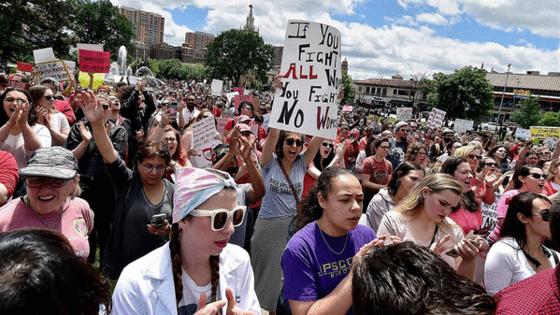Missouri is voting on abortion rights. Here's everything to know about Amendment 3
Published in Political News
KANSAS CITY, Mo. — After two years of legal battles, signature gathering and fierce debates, Missouri is about to make a decision on the future of abortion rights and access in the state when it votes on Amendment 3.
Missouri is one of 10 states voting on abortion rights in November 2024. About half of those could overturn current bans or restrictions, including Missouri, South Dakota, Florida, Nebraska and Arizona.
Missouri has effectively banned abortion at all stages of pregnancy, “except in cases of medical emergency,” since the U.S. Supreme Court overturned Roe v. Wade in 2022 with its decision in Dobbs v. Jackson Women’s Health Organization. The state legislature had passed a “trigger law” and implemented the ban just minutes after the decision in 2022.
But that could change with Amendment 3, Missouri’s ballot initiative up for a vote in the Nov. 5, 2024, election. Here’s what to know about your vote, the amendment’s impact and abortion access in Missouri.
What does Amendment 3 say?
Do you want to amend the Missouri Constitution to:
•establish a right to make decisions about reproductive health care, including abortion and contraceptives, with any governmental interference of that right presumed invalid;
•remove Missouri’s ban on abortion;
•allow regulation of reproductive health care to improve or maintain the health of the patient;
•require the government not to discriminate, in government programs, funding, and other activities, against persons providing or obtaining reproductive health care; and
•allow abortion to be restricted or banned after Fetal Viability except to protect the life or health of the woman?
State governmental entities estimate no costs or savings, but unknown impact. Local governmental entities estimate costs of at least $51,000 annually in reduced tax revenues. Opponents estimate a potentially significant loss to state revenue.”
What would a yes vote mean?
A “yes” vote on Amendment 3 would support overturning Missouri’s near-total ban on abortion.
If the amendment passes, the state would be prohibited from restricting abortion access or limiting state funding to organizations because they provide abortion or contraceptives — mostly impacting family planning and women’s health clinics like Planned Parenthood. State legislators could still restrict abortion past the point of fetal viability, which is when a fetus could potentially survive outside of the womb.
These rights and changes would be enshrined in the state constitution and would be more difficult to overturn through legislation than the state’s previous restrictive abortion rights were.
What would a no vote mean?
A “no” vote on Amendment 3 would support Missouri’s abortion rights and laws remaining the same, keeping the current ban on abortion in place. People needing abortions could still legally go to another state, like Illinois or Kansas, to access the procedure.
What does fetal viability mean for abortion in Missouri?
There is no set time period at which a pregnancy reaches fetal viability, so the exact point at which Missouri legislators could restrict abortion if the amendment passes is not yet clear.
How Missouri defines fetal viability — generally the point at which a fetus can survive outside the womb — will be key to determining future legislation, and likely court decisions. Lawmakers could ban abortion after viability as long as they include exceptions for the life, physical or mental health of the pregnant person.
Amendment 3 defines fetal viability as the point in pregnancy “when, in the good faith judgment of a treating health care professional and based on the particular facts of the case, there is a significant likelihood of the fetus’s sustained survival outside the uterus without the application of extraordinary medical measures.”
But Amendment 3 doesn’t define “extraordinary medical measures” — leaving unclear on the proposal’s face what counts as extraordinary vs. ordinary care.
The ballot measure’s definition is narrower than Missouri’s current abortion law. It defines viability as “that stage of fetal development when the life of the unborn child may be continued indefinitely outside the womb by natural or artificial life-supportive systems.”
Medical providers broadly caution that viability is a fluid concept that depends on many factors. Delivery before 23 weeks is almost universally fatal, while some studies have found survival rates of more than 50% for infants born at 24 weeks, according to data summarized by ACOG and the Society for Maternal-Fetal Medicine.
Why does Amendment 3 say it will cost governments money?
It’s impossible to predict the exact economic impacts of restoring abortion rights in Missouri. But it’s up to the state to make an educated guess — and guesses varied widely in the years leading up to Amendment 3’s inclusion on the ballot.
After the state called for estimates and officials went through a legal battle, the language that appears on the final ballots comes from Greene County, which includes Springfield.
“Greene County estimated that 135 future citizens would be lost in that county annually due to legalizing abortion in Missouri,” state Attorney General Andrew Bailey wrote. “It estimated nearly $51,000 in lost revenue annually to that county based on the reduced population base.”
The predicted population loss was based on the number of abortions recorded in 2020, he added.
So the $51,000 figure you’ll see on your ballot comes from one Missouri county’s estimate of hypothetical lost tax revenue from 135 nonexistent residents. But not everyone agrees that it’s the right number to appear on the ballot — some say restoring abortion rights would cost the state nothing, while opponents of the amendment have proposed estimates in the billions of dollars.
What does the amendment mean for medication abortions?
If Missouri voters overturn the state’s abortion ban in November, how widely available abortion eventually becomes will depend in large part on whether courts block the state’s current restrictions on medications commonly used to end a pregnancy.
Before Missouri banned abortion in 2022, state laws and regulations had effectively thwarted Missouri’s sole abortion provider, a Planned Parenthood clinic in St. Louis, from using mifepristone and misoprostol, the two primary abortion medications.
Providers were required to perform a pelvic exam prior to an abortion, and physicians had to be physically present with patients when they took the first medication, mifepristone, to induce an abortion.
All of those rules remain on the books and, in theory, could be revived if voters on Nov. 5 approve Amendment 3. But in practice the regulations would almost certainly face an aggressive challenge from abortion advocates.
How quickly could abortions be available if Missouri’s ban is overturned?
For all of the excitement, the actual process and timeline of restoring abortion access remains incredibly murky.
The amendment, which would take effect 30 days after the vote, would almost certainly kick off a series of legal battles that would decide how soon those protections could actually allow abortion access.
Even before it banned nearly all abortions in 2022, Missouri had for decades enacted restrictions on providers that whittled down access to just one clinic by 2019. Those laws, as well as the abortion ban itself, would likely have to be struck down in court if the amendment passes.
Interviews with constitutional experts, lawmakers and abortion rights supporters and opponents emphasized the fact that abortion access will not return to Missouri overnight if the amendment passes. But it would offer a pathway to tear down the ban and years of restrictions, allowing providers to eventually offer the procedure again.
Would minors have to get parental permission for abortions?
If abortion becomes legal again in Missouri, the laws that governed it before the state’s 2022 trigger ban would still be on the books. This includes state statutes that required minors to get parental permission or a court order before obtaining an abortion unless they are legally emancipated.
However, these laws could be challenged in court if Amendment 3 passes. That’s because the amendment would ban government interference in the right to make decisions about reproductive health care.
If the law is challenged, it would be up to a judge to decide whether requiring parental approval or a court order constitutes government interference in decisions about this care.
Would Amendment 3 have implications for gender-affirming surgery?
No. Amendment 3 has nothing to do with gender-affirming health care for minors or adults. It would not change the way Missouri regulates this care or the insurance that covers it.
Missouri Sen. Josh Hawley, who is running for reelection in November, claimed in early September 2024 that the amendment is broadly worded enough to include gender-affirming surgeries in its definition of reproductive health care. However, experts say this interpretation is overly broad and unrealistic.
How common was abortion before Missouri’s ban?
Because there was only one abortion clinic in Missouri at the time the ban was passed, the Reproductive Health Services of Planned Parenthood of the Saint Louis Region, very few procedures were taking place in the state even before 2022.
Statistics kept by the state’s Office of Vital Statistics show 150 abortions recorded in 2021 and 88 in 2022, the most recent full year of data available. Those numbers showed a huge dip over 12 years, with 6,163 in-state abortions recorded in 2010.
The same report also tracks the number of Missouri residents who obtained an abortion, regardless of where the procedure happened, based on individual records. It shows about 3,000 abortions in 2022 and about 3,600 in 2021. In comparison, more than 9,000 Missouri residents obtained abortions in 2010.
But the numbers could be much higher. The state estimates the true number of residents who obtained abortions as about 10,000 people in 2022 and 11,000 in 2021. Even at that higher estimate, abortions would have occurred at a rate of about 161 abortions for every 1,000 live births.
Would Amendment 3 hurt human trafficking survivors?
Some people claim that Amendment 3 would remove a requirement for medical providers to report suspected sex trafficking, shielding traffickers from culpability.
Missouri already does not require mandated reporters, including health care providers, to report suspected instances of human or sex trafficking unless the victim is a minor or a vulnerable adult, meaning a senior or a person with disabilities.
The text of Amendment 3 doesn’t preclude health care workers from immediately reporting suspected trafficking of minors. It merely prevents them from delaying or restricting their patients’ abortion care without a good reason.
Would Amendment 3 prevent malpractice lawsuits?
Amendment 3 contains a line that some critics have interpreted to mean it would nullify all future lawsuits related to reproductive care, including malpractice related to abortion, childbirth and even fertility treatments.
The line reads: “Nor shall any person assisting a person in exercising their right to reproductive freedom with that person’s consent be penalized, prosecuted, or otherwise subjected to adverse action for doing so.”
But Missouri’s Western District Court of Appeals already ruled in October 2023 that abortion providers would remain liable for malpractice if abortion rights were restored in the state.
Who can vote and how?
Any U.S. citizen and Missouri resident who will be 18 by Election Day can vote on the ballot issue, as long as they registered to vote by Oct. 9 for the 2024 election.
You don’t have to be affiliated with any political party, and you don’t have to vote on all the issues or races on the ballot.
Ahead of the election, you can look up your information on the Missouri secretary of state’s voter portal to make sure you’re registered to vote, see your mock ballot and get info about when and where to vote.
©2024 The Kansas City Star. Visit at kansascity.com. Distributed by Tribune Content Agency, LLC.































































Comments